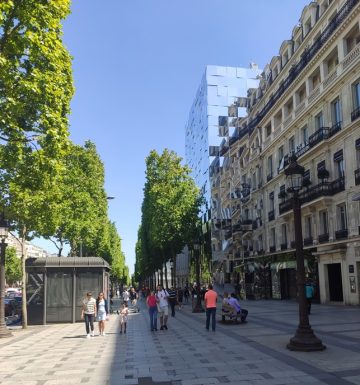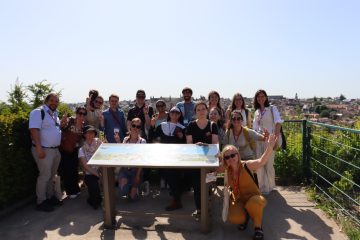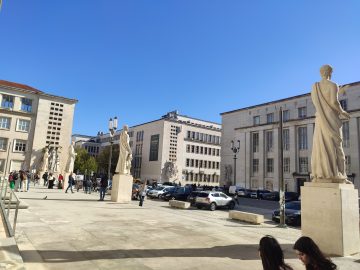From Paris to Coimbra in 150 days
Daria Mesquita Ramalho
 The busy Parisian streets were sizzling hot. People were looking for shelter in cozy cafés, under the shadow of the Boulogne woods, and in the air-conditioned stores along the Champs Élysées. It was the middle of June 2022, and I was waiting for a train to Poitiers in a crowded train station. I was heading to an event that would spur my networking and collaboration with PhD students from seven European universities. Thanks to a European Campus of City-University alliance (EC2U) grant I could travel to France and participate in an intensive course on machine learning and text processing in linguistics and cultural studies.
The busy Parisian streets were sizzling hot. People were looking for shelter in cozy cafés, under the shadow of the Boulogne woods, and in the air-conditioned stores along the Champs Élysées. It was the middle of June 2022, and I was waiting for a train to Poitiers in a crowded train station. I was heading to an event that would spur my networking and collaboration with PhD students from seven European universities. Thanks to a European Campus of City-University alliance (EC2U) grant I could travel to France and participate in an intensive course on machine learning and text processing in linguistics and cultural studies.
Data processing is time-consuming and is prone to error, for instance due to researchers’ attention fatigue. A machine, on the contrary, is never tired and has an infinitely faster processing speed compared to a human. Why don’t we substitute human analysis with machine learning and text processing tools? These were my thoughts before the course in Poitiers. I was going to learn how I could apply data mining in my study aiming to describe what it takes to become proficient in English as a foreign language learner. To answer this question, I’m collecting data on explicit and implicit knowledge of proficient L2 users and combine it with research on their working memory and language aptitude.
 The University of Poitiers was founded in 1431. It’s the alma mater of many famous figures in history. Four hundred years after Rene Descartes got his bachelor’s degree, a group of PhD students from Finland, Italy, France, Germany, Portugal, Romania, and Spain gathered together at the same university to learn more about machine learning. The event lasted for three days during which we got acquainted with the ORANGE data mining toolkit (Orange Data Mining – Data Mining) and explored the differences between artificial intelligence, machine learning, language processing, and deep learning. Some presentations were more technical and focused on concepts like information extracting and parsing, also known as syntactic annotation. There were thematic groups where the participants discussed their research and got feedback from both peers and professors from collaborating universities.
The University of Poitiers was founded in 1431. It’s the alma mater of many famous figures in history. Four hundred years after Rene Descartes got his bachelor’s degree, a group of PhD students from Finland, Italy, France, Germany, Portugal, Romania, and Spain gathered together at the same university to learn more about machine learning. The event lasted for three days during which we got acquainted with the ORANGE data mining toolkit (Orange Data Mining – Data Mining) and explored the differences between artificial intelligence, machine learning, language processing, and deep learning. Some presentations were more technical and focused on concepts like information extracting and parsing, also known as syntactic annotation. There were thematic groups where the participants discussed their research and got feedback from both peers and professors from collaborating universities.
 However, this EC2U course was not only about studying. The organizers prepared diverse cultural activities that helped us to know each other better and strengthen new friendships in an informal setting. The group did sightseeing and had a city tour with a guide who impersonated Eleanor of Aquitaine. In the evening, the participants met at a downtown restaurant to try authentic French cuisine. After three days of intensive work, it was time to say goodbye.
However, this EC2U course was not only about studying. The organizers prepared diverse cultural activities that helped us to know each other better and strengthen new friendships in an informal setting. The group did sightseeing and had a city tour with a guide who impersonated Eleanor of Aquitaine. In the evening, the participants met at a downtown restaurant to try authentic French cuisine. After three days of intensive work, it was time to say goodbye.
I was very happy to meet so many of the PhD students from the workshop in Poitiers at another EC2U event at the University of Coimbra in November. A three-day workshop brought together researchers of multilingual learning and teaching practices. The speakers discussed intercultural dialogue, lived experiences of multilingual speakers, language landscapes, and language policies. Unfortunately, I got sick and could not fully enjoy the seminars.  Collaboration did not end after we all went home. I have asked some PhD students to pilot my study and in March I’m giving a presentation at the EC2U Winter School of Multilingualism, European Languages and Societies (13–17 March 2023) hosted by the University of Turku. The focus of the winter school is on less taught languages, language policy, local multilingualism, and multilingual spaces. The program consists of lectures by plenary speakers, presentations, a panel discussion, and workshops.
Collaboration did not end after we all went home. I have asked some PhD students to pilot my study and in March I’m giving a presentation at the EC2U Winter School of Multilingualism, European Languages and Societies (13–17 March 2023) hosted by the University of Turku. The focus of the winter school is on less taught languages, language policy, local multilingualism, and multilingual spaces. The program consists of lectures by plenary speakers, presentations, a panel discussion, and workshops.
